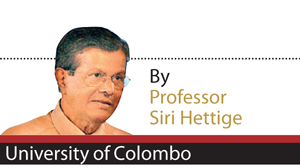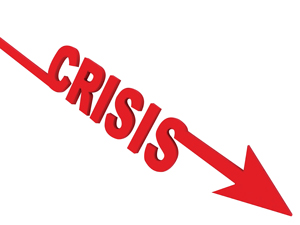Reply To:
Name - Reply Comment
Last Updated : 2024-04-18 22:44:00


The present state of affairs in the country can be described only as a national calamity.
This is due to the convergence of a number of economic, social, environmental and political crises. All of these crises are serious and cannot be easily resolved. This is a time when one would expect those who are entrusted with the responsibility of managing public affairs to come up with the best possible collective response to deal with the situation in order to protect the people from their short term and long term negative impacts.
But, instead, what we witness is an almost total disregard for the well-being of the people who elect and send their representatives to parliament, hoping that they will use their term of office as legislators to discuss and debate various issues in order to find optimal solutions.
But what happened last week in the national Parliament is not only shocking but also leaves little room for people to hope that the democratic process is going to facilitate a constructive process of rational planning to deal with the pressing issues of the day in order to find reasonable solutions. It seems that many politicians are not ready to move beyond petty sectarian politics and look at people’s problems as national problems.

This is true not only with respect to the economic crisis but also regarding a host of other issues such as national reconciliation, serious problems in the health and education sectors and the worsening environmental situation.
It is a fact that a majority of the people in the country, irrespective of where they are and what they do, have a hard time and face an uncertain future. A majority of school leavers have to either join the informal sector or seek overseas employment. Though basic healthcare is available at public hospitals, in the absence of a national health insurance scheme, episodes of serious illness can drain the families of whatever savings they have accumulated over time.
While it is true that even poor children have access to free education, private tuition that has become so common throughout the country is a major financial burden on families. More money you spend on private tuition, greater your chances of getting through the national examinations. So, the winners are usually those who can afford such expenditure on a regular basis.
Overall, the quality of public education is very poor, largely thanks to poor quality teachers. The result is that many students are pushed into non-professional academic streams and face very poor prospects in terms of employment.
Private transport has come to the forefront at the expense of public transport. Successive governments have turned a blind eye to the issue, making the situation worse over time. Today the transport sector in the country is a nightmare. Several million motorbikes and three wheelers scramble through heavy traffic on congested roads, creating dangerous and extremely unhealthy conditions for everybody. The most affected are the vulnerable groups such as children, the elderly and the poor.
The energy sector is perhaps the most mismanaged due to the absence of an enlightened long term policy. The country benefitted immensely from the Mahaweli Project that enabled the expansion of hydro power production in the 1980s. But increasing demand for electricity since then has been met mostly by non- renewable sources, making electricity production more expensive and extremely polluting. Had we made the shift to renewable energy in the 1990s, by now, we would have not only cut down energy costs but also saved the environment to a large extent.
We can go on and on to look at various sectors and the story is not very different. In short, the failure of the Sri Lankan State to adopt a technocratic approach to policy making has resulted in a policy paralysis leading to a steady deterioration of political, economic, social and environmental conditions in the country.
In fact, we have brought almost everything down to the lowest common denominator.
We have not set high standards for anything. As a result, quality of functionaries in almost every field such as politics, education, public service, the judiciary, law enforcement, media, and the universities has steadily declined. Reversing this trend is critical if the country is to recover from the above deterioration. A significant section of the population felt the need to do so and they came forward at the beginning of last year to bring about a change in the way the public affairs are managed in the country.
But now it is clear that it is not easy. The biggest question is this; where can the myopic, self-seeking and corrupt politicians and their retinue go, if they were to give way to more enlightened types? The fact of the matter is that, despite all the hardships that the ordinary masses faced, ruling party politicians and their stooges had comfortable lives at public expense.
Populist policies provide a cover even for the most myopic regimes across the world. Such regimes appeal to popular sentiments and offer short term relief to important constituencies in order to maintain their legitimacy.
But, in the absence of rational polices, social and economic conditions can only get worse, necessitating a return to a more sensible approach to public policy making. Today, we have a highly distorted economy that needs to be revamped to make it more productive and sustainable.
Our social sectors such as health, education and transport need a thorough overhaul to make them socially responsible, just and responsive to social and economic needs. Our natural resource base which has come under severe pressure over the last several decades needs to be nurtured, managed and utilized in keeping with ecological imperatives and social, economic and cultural requirements. All these and more cannot be done by resorting to rouge and violent politics.
We need to adopt a saner approach to managing public affairs. Public discourse in this country today should focus almost entirely on this issue, in order to impress upon the masses that their future prospects depend on a different kind of politics than what they have seen in the country in the recent past. It is the responsibly of all politicians, however difficult it may be, to adapt to the new environment and conduct themselves in a way that can promote wider public interest.

Add comment
Comments will be edited (grammar, spelling and slang) and authorized at the discretion of Daily Mirror online. The website also has the right not to publish selected comments.
Reply To:
Name - Reply Comment
On March 26, a couple arriving from Thailand was arrested with 88 live animal
According to villagers from Naula-Moragolla out of 105 families 80 can afford
Is the situation in Sri Lanka so grim that locals harbour hope that they coul
A recent post on social media revealed that three purple-faced langurs near t

10 Apr 2024
09 Apr 2024